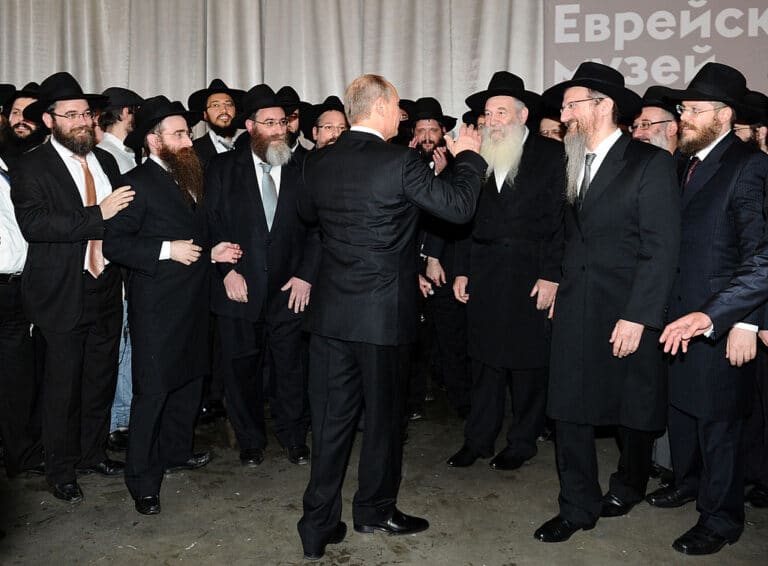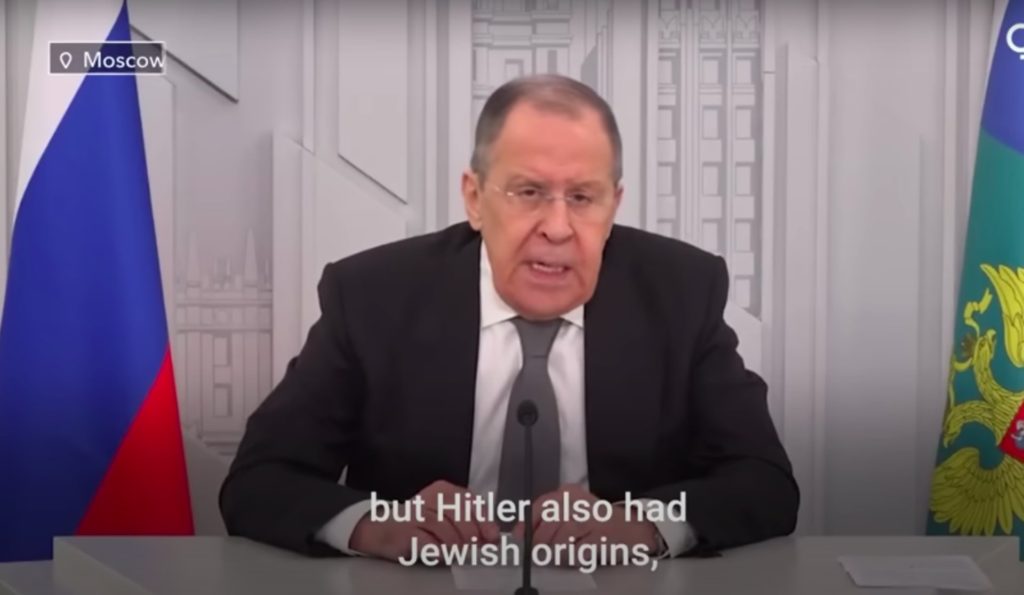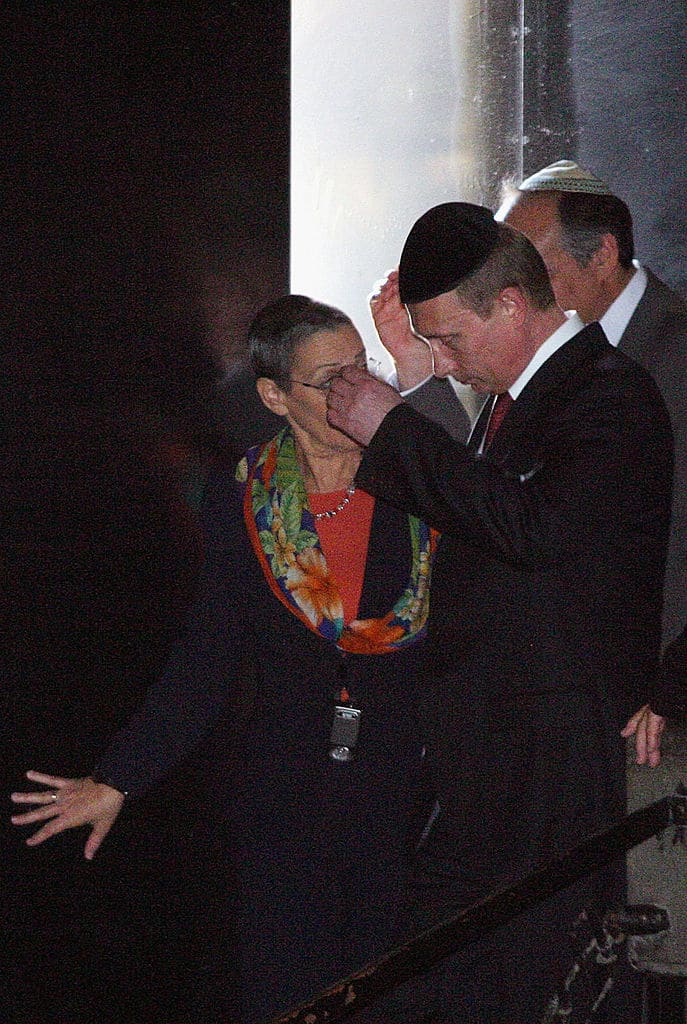
The spiritual leader of Moscow’s Jewish community is in exile following pressure by Russian authorities to endorse the invasion of Ukraine.
The news was announced by Rabbi Pinchas Goldschmidt’s daughter-in-law on Twitter.
Can finally share that my in-laws, Moscow Chief Rabbi @PinchasRabbi & Rebbetzin Dara Goldschmidt, have been put under pressure by authorities to publicly support the 'special operation' in Ukraine — and refused. pic.twitter.com/Gy7zgI3YkJ
— Avital Chizhik-Goldschmidt (@avitalrachel) June 7, 2022
Avital Chizhik-Goldschmidt, a Manhattan-based journalist, announced that her father-in-law: “flew to Hungary two weeks after the Russian invasion of Ukraine. They are now in exile from the community they loved, built & raised their children in, over 33 years.”
According to the Jerusalem Post, Rabbi Goldschmidt was recently re-elected as Moscow’s chief rabbi against the wishes of the Russian government.
Rabbi Goldschmidt is not the first rabbi to flee Russia since the invasion of Ukraine.
Still to this day rabbis in Russia are monitored closely by the government. What Russian Jewish leaders say, who they meet with, etc… all of this can have consequences. Rabbis continue to leave the country in clandestine missions this very day. 3/17 https://t.co/7BytIakx6r
— Johnny Kunza (@johnkunza) May 2, 2022
Earlier in the war it was announced that an unnamed Russian rabbi was secretly transported out of the country by Polish authorities. Furthermore, Russia has banned several rabbis from entering the country due to their support for Ukraine.
Despite this, and adding to the confusion over Goldschmidt’s exile, several rabbis who have been vocal against the Ukrainian invasion have been allowed to stay in Russia including the country’s chief rabbi.
Jewish leaders still in Russia however face heavy surveillance and have many of their movements and actions monitored by the government.
Rising tensions in Russia

In an interview in May on the Ukrainian president, the Russian Foreign Minister said: “Zelensky is a Jew? Hitler also had Jewish origins. The greatest antisemites are precisely the Jews.”
Sergey Lavrov, the Russian foreign minister, went on to say that “the fact that [Ukrainian President Volodymyr Zelensky] is a Jew does not negate the Nazi elements in his country.”
“I believe that Adolf Hitler also had Jewish blood,” Lavrov added.
This is 100% false and what makes the Russian claims even more egregious is that Zelensky lost family members to the Nazis.
The comments made by Lavrov to an Italian television station were a major escalation in the widely debunked claims that Russia invaded Ukraine in order to “de-Nazify it.”
Israel formally summoned the Russian ambassador to condemn the claims immediately following the foreign minister’s comments.
Vladimir Putin and Judaism

Russia’s chief rabbi, Berel Lazar, said in 2011 Putin “paid great attention to the needs of our community and related to us with a deep respect.”
But the Russian president is also not beyond playing politics with the Jews.
According to Israeli newspaper Haaretz, in July of 2021 Putin denied “Ukrainians’ existence as a distinct national group … insisting that just like Jewish communities around the world, ‘Russians and Ukrainians are a single people.’”
Speaking during his annual televised call-in show, in which the authoritarian leader fields questions from citizens, Putin declared that “the single Russian people” had been divided “under the influence of external factors” and that while “the current authorities of modern Ukraine are clearly unfriendly to us,” this does not mean that the two people are not one.
“See for yourself,” he said. “The Jews come to Israel from Africa, Europe, and other countries. Black people arrive from Africa, right? Those arriving from Europe speak Yiddish, rather than Hebrew. Although they are diverse, the Jewish people, nevertheless, cherished its unity.”
Ukraine’s Jewish president responded back in a statement saying, Ukrainians are “definitely not one people.”
Jews in Russia
Russia once had one of the largest Jewish populations in the world and today an estimated 165,000 Jews still live in the country making it the fourth largest community in the world.
Following the collapse of the Soviet Union in 1989 an estimated 1.6 million Soviet Jews and their non-Jewish families left the country. Around 979,000 Soviet Jews immigrated to Israel and 325,000 to the United States.
This is not the first time Russian Jews have been silenced or faced exile.

The exodus began with Natan Sharansky’s arrival in Israel in 1986. Sharansky was born in Ukraine (then part of the Soviet Union). The Jewish community there was facing oppression under the Soviet regime.
The Jewish community’s “religious life was squashed by the [Soviet] authorities,” Israeli author Matti Friedman explained on the Tikvah podcast.
“They were not allowed to express their Judaism. They were not allowed to express Zionism, which was virulently opposed by the Soviet regime and condemned as a form of racism, and they were not allowed to leave for Israel,” Friedman said.
But Soviet Jews faced immense difficulty in emigrating from Russia to countries that respected their basic human rights. Even just applying to leave the country had seriously harsh consequences.
If they applied, Russian Jews almost surely lost their jobs, were blacklisted, and even faced imprisonment, which meant that hundreds of thousands of Jews were stuck in Russia against their will.
These Jews came to be known as the “refuseniks,” and their plight became the focal point of the free Soviet Jewry Movement. Sharansky became the icon of the refusenik campaign and the one person who came to personify Soviet Jewry’s struggle. Watch our video to learn more about the refuseniks and the movement to free Soviet Jewry.
In 1973, Sharansky applied for an exit visa to Israel, but was denied. Following this denial, Sharansky became an activist and advocate for Soviet Jewish emigration, which in 1978 resulted in his arrest by the Soviets for trumped up charges of treason and spying for the US.
Sharansky was sentenced to 13 years in a forced labor camp in Siberia. This galvanized the American Jewish community to push for the freedom of Soviet Jewry. Sharansky was freed in 1986 and moved to Israel where he was welcomed as a hero.
While Sharansky was free, three million Jews were still left behind the Iron Curtain facing oppression. In 1989, as the Soviet Union began to collapse, Soviet leader Mikhail Gorbachev approved measures that allowed Jews to leave the country. In the next decade, more than one million Russians immigrated to Israel.
Originally Published Jun 8, 2022 08:22AM EDT
